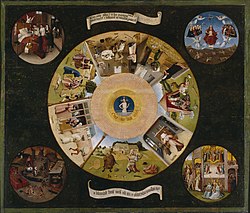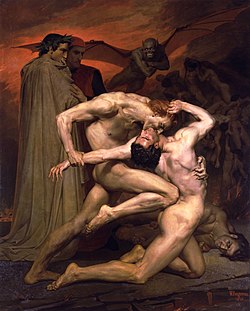Sin: Difference between revisions
No edit summary |
No edit summary |
||
| Line 9: | Line 9: | ||
{{Main|Forgiveness of Sins}} | {{Main|Forgiveness of Sins}} | ||
A sin that has been committed always has an effect on the '''sinner'''. He thereby damages his [[soul]] and is burdened with [[karma]], which later demands compensation that only he can provide. Minor sins can be atoned for in the same earthly life or can be wiped away after death in the [[Kamaloka]]. More serious transgressions can only be expiated in later incarnations. The human being is thus forced into the process of [[reincarnation]], which, however, also opens up the possibility of gradually developing an independent self in [[repeated earthly lives]]. However, sins do not only have individual consequences for the sinner himself, but they also leave objective traces in the world, which cannot be completely erased by man himself. For this he needs the help of the [[Christ]], who by [[grace]] through his sacrificial act on [[Golgotha]] took upon himself the " | A sin that has been committed always has an effect on the '''sinner'''. He thereby damages his [[soul]] and is burdened with [[karma]], which later demands compensation that only he can provide. Minor sins can be atoned for in the same earthly life or can be wiped away after death in the [[Kamaloka]]. More serious transgressions can only be expiated in later incarnations. The human being is thus forced into the process of [[reincarnation]], which, however, also opens up the possibility of gradually developing an independent self in [[repeated earthly lives]]. However, sins do not only have individual consequences for the sinner himself, but they also leave objective traces in the world, which cannot be completely erased by man himself. For this he needs the help of the [[Christ]], who by [[grace]] through his sacrificial act on [[Golgotha]] took upon himself the "'''Sins of the World'''", i.e. the objective consequences of human transgressions, and in particular is also willing to take the burden of original sin from human beings. This is the true meaning of the forgiveness of sins, which, however, in no way relieves man from bearing the karmic consequences of his actions. If the Christ were not willing to take the sins of the world upon Himself, the karma of human beings would indeed be approximately balanced at the end of the earth's evolution, "but the earth would not be ready to evolve over to Jupiter and all earth humanity would be there without a dwelling place..." {{GZ||155|176ff}} | ||
== Literature == | == Literature == | ||
Revision as of 14:42, 26 August 2021


Sin (Greek: ἁμαρτία hamartia "to miss a goal", synonymous with Hebrew: חֵטְא chet "sin, guilt" used in the Old Testament; Latin: peccatum, derived from the Indo-European: *ped "to walk, fall, stumble", cf. Latin: pes "foot"), through which man imposes karmic guilt on himself, is a consequence of the Fall of Man caused by the Luciferic temptation, through which man, burdened with the original sin, was thrust into the sensual world and thereby increasingly withdrawn from the direct guidance of the gods. On the one hand, this opened the gate to freedom for man, through which he can bring his actions in thoughts, words and deeds into harmony with the will of the spiritual world by his own free decision and thereby enrich it through his individual contribution; on the other hand, if he, tempted by Lucifer and Ahriman, directs his egoistic desires towards the sensual world, he can also miss his spiritual goal of development and thereby fall into sin.
Sins as momentary transgressions have their seat in the astral body, while vices as permanent bad habits work in the etheric body. The well-known "Seven Deadly Sins" (see the painting by Hieronymus Bosch on the right) are in fact Seven Deadly Vices to which man can fall prey.
Forgiveness of Sins and Karma
A sin that has been committed always has an effect on the sinner. He thereby damages his soul and is burdened with karma, which later demands compensation that only he can provide. Minor sins can be atoned for in the same earthly life or can be wiped away after death in the Kamaloka. More serious transgressions can only be expiated in later incarnations. The human being is thus forced into the process of reincarnation, which, however, also opens up the possibility of gradually developing an independent self in repeated earthly lives. However, sins do not only have individual consequences for the sinner himself, but they also leave objective traces in the world, which cannot be completely erased by man himself. For this he needs the help of the Christ, who by grace through his sacrificial act on Golgotha took upon himself the "Sins of the World", i.e. the objective consequences of human transgressions, and in particular is also willing to take the burden of original sin from human beings. This is the true meaning of the forgiveness of sins, which, however, in no way relieves man from bearing the karmic consequences of his actions. If the Christ were not willing to take the sins of the world upon Himself, the karma of human beings would indeed be approximately balanced at the end of the earth's evolution, "but the earth would not be ready to evolve over to Jupiter and all earth humanity would be there without a dwelling place..." (Lit.:GA 155, p. 176ff)
Literature
- Edelgard Vietor: Schuld und Sünde. Erkennen - verwandeln - verzeihen, Urachhaus Vlg, Stuttgart 2002
- Rudolf Steiner: Christus und die menschliche Seele, GA 155 (1994), ISBN 3-7274-1550-9 English: rsarchive.org German: pdf pdf(2) html mobi epub archive.org
- Rudolf Steiner: Aus den Inhalten der esoterischen Stunden, Band III: 1913 und 1914; 1920 – 1923, GA 266/3 (1998), ISBN 3-7274-2663-2 English: rsarchive.org German: pdf pdf(2) html mobi epub archive.org
 |
References to the work of Rudolf Steiner follow Rudolf Steiner's Collected Works (CW or GA), Rudolf Steiner Verlag, Dornach/Switzerland, unless otherwise stated.
Email: verlag@steinerverlag.com URL: www.steinerverlag.com. Index to the Complete Works of Rudolf Steiner - Aelzina Books A complete list by Volume Number and a full list of known English translations you may also find at Rudolf Steiner's Collected Works Rudolf Steiner Archive - The largest online collection of Rudolf Steiner's books, lectures and articles in English. Rudolf Steiner Audio - Recorded and Read by Dale Brunsvold steinerbooks.org - Anthroposophic Press Inc. (USA) Rudolf Steiner Handbook - Christian Karl's proven standard work for orientation in Rudolf Steiner's Collected Works for free download as PDF. |
